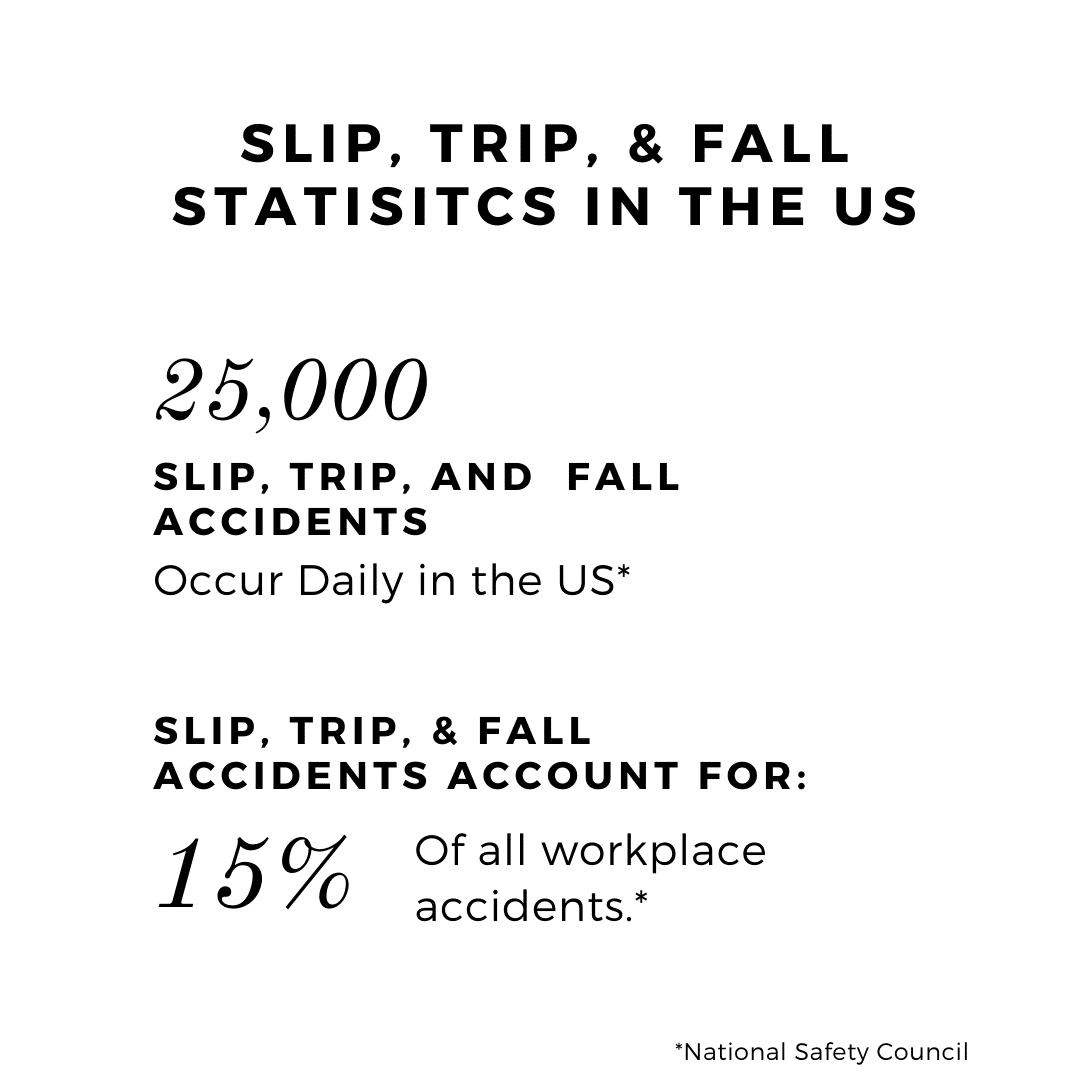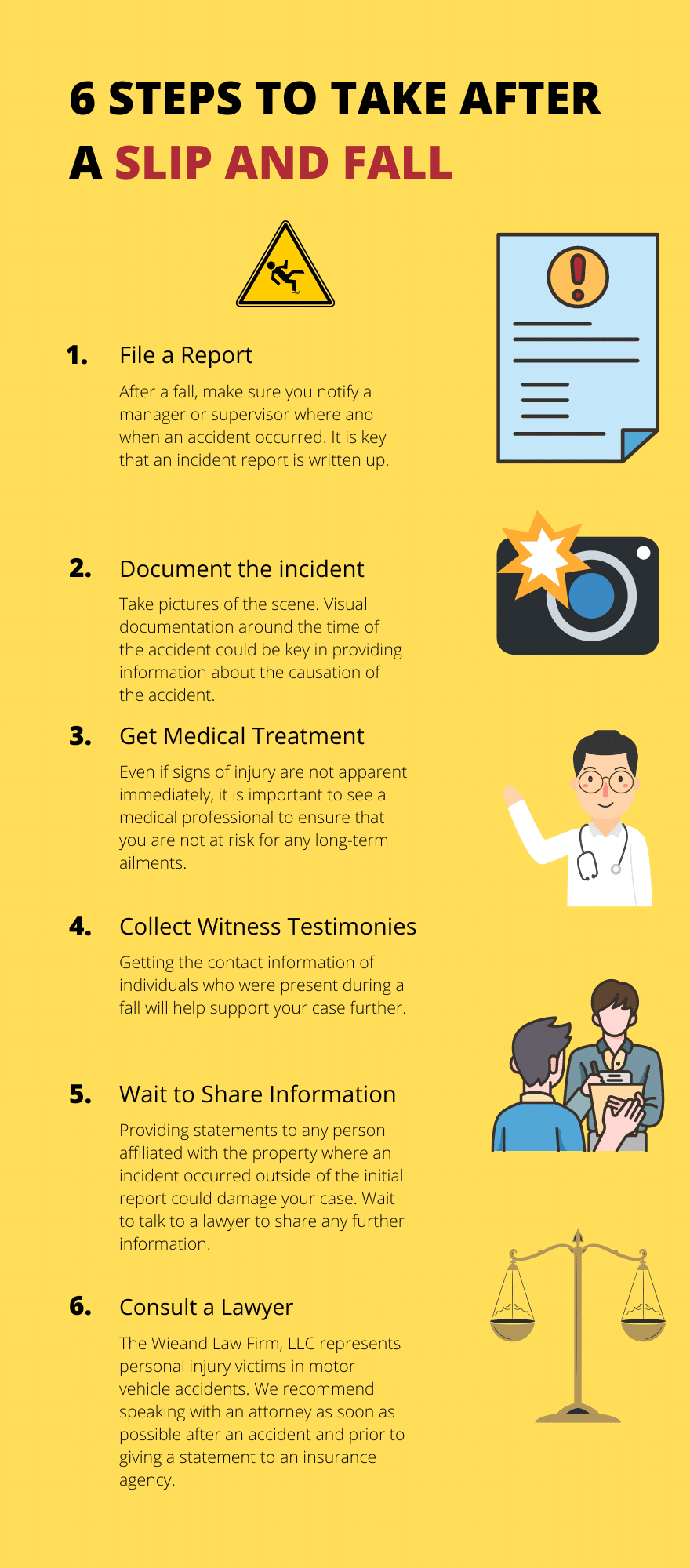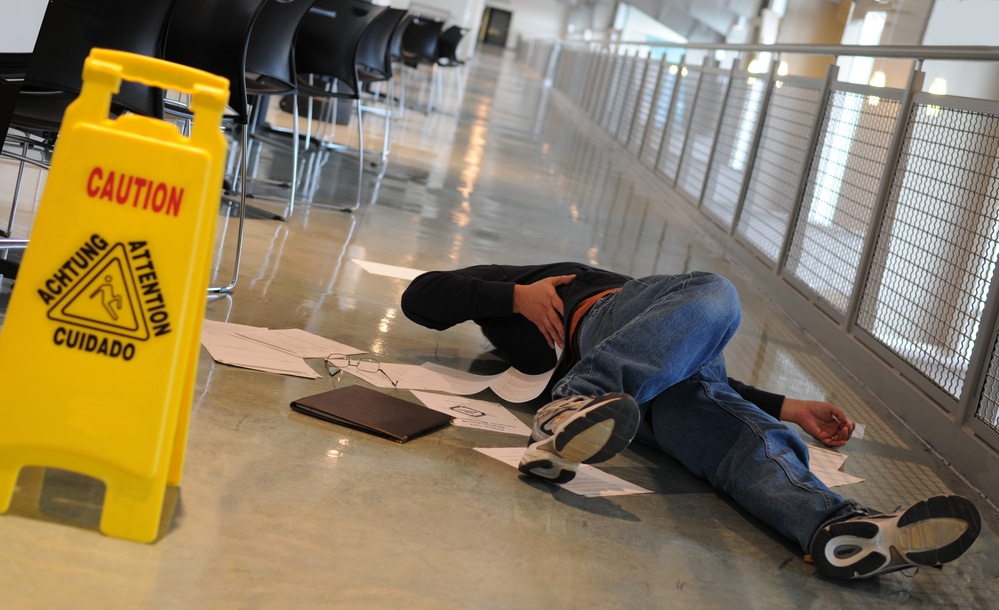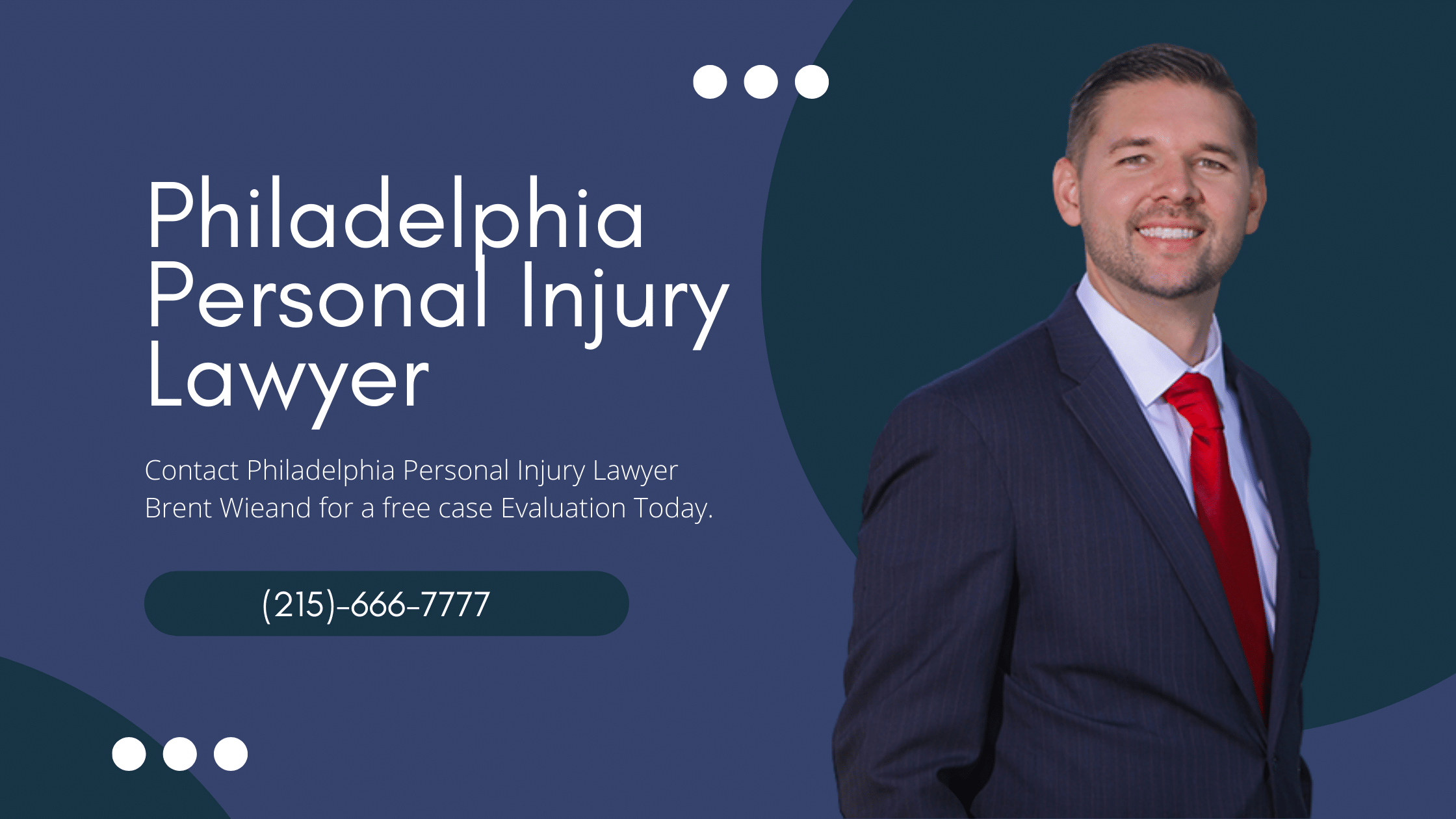 Philadelphia slip and fall lawyers at the Wieand Law Firm represent individuals who have suffered a spinal cord injury due to someone else’s negligence. Spinal cord injuries are common in slip and falls because these types of accidents can cause sudden and forceful impacts on the body, especially on the spine. When a person slips and falls, their body may experience a rapid acceleration and deceleration, which can cause the spine to twist, bend or compress beyond its normal range of motion. This sudden force can damage the spinal cord, which is a bundle of nerves that runs down the center of the back and carries messages from the brain to the rest of the body. Philadelphia slip and fall lawyers at our firm represent victims of slip and fall accidents that were injured due to another party’s negligence.
Philadelphia slip and fall lawyers at the Wieand Law Firm represent individuals who have suffered a spinal cord injury due to someone else’s negligence. Spinal cord injuries are common in slip and falls because these types of accidents can cause sudden and forceful impacts on the body, especially on the spine. When a person slips and falls, their body may experience a rapid acceleration and deceleration, which can cause the spine to twist, bend or compress beyond its normal range of motion. This sudden force can damage the spinal cord, which is a bundle of nerves that runs down the center of the back and carries messages from the brain to the rest of the body. Philadelphia slip and fall lawyers at our firm represent victims of slip and fall accidents that were injured due to another party’s negligence.
The severity of a spinal cord injury from a slip and fall can vary, ranging from mild to severe. In some cases, a slip and fall may only result in a temporary or partial spinal cord injury, such as a bruise or contusion. However, in more serious cases, a slip and fall can cause a complete or partial spinal cord injury, which can lead to permanent paralysis or loss of sensation in different parts of the body.
Preventing slip and falls is important to reduce the risk of spinal cord injuries. This can be done by keeping walkways clear of hazards, wearing proper footwear, and using handrails when available. When property owners fail to take the proper precautions and someone is injured, the may be liable for that injury. Philadelphia slip and fall lawyers can help injured victims recover the compensation they deserve when negligence caused a serious fall accident.
Types and Levels of Spinal Cord Injuries
There are two main types of spinal cord injuries: incomplete and complete.
- Incomplete spinal cord injury: This type of injury means that the spinal cord is only partially damaged, and there is some degree of sensation and movement below the level of injury. The extent of the injury can vary widely depending on the severity and location of the damage.
There are several types of incomplete spinal cord injuries, including:
- Anterior cord syndrome: Damage to the front of the spinal cord that can result in loss of movement and sensation below the level of injury.
- Brown-Sequard syndrome: Damage to one side of the spinal cord that can result in paralysis and loss of sensation on one side of the body and loss of pain and temperature sensation on the other side.
- Central cord syndrome: Damage to the center of the spinal cord that can result in weakness or paralysis in the arms and hands, while the legs remain unaffected.
- Posterior cord syndrome: Damage to the back of the spinal cord that can result in loss of coordination and fine motor skills.
- Complete spinal cord injury: This type of injury means that the spinal cord is completely severed, resulting in the loss of all sensation and movement below the level of injury. There are no signals that can travel from the brain to the rest of the body.
High Cervical Nerve Spinal Cord Injuries
A high cervical nerve spinal cord injury can affect the function of the neck, shoulders, arms, and possibly the legs, depending on the severity of the injury. The most common symptoms after a high cervical nerve spinal cord injury include:
- Loss of sensation or altered sensation in the arms, hands, and fingers.
- Loss of motor function or weakness in the arms and hands.
- Difficulty breathing or need for mechanical ventilation.
- Loss of bowel and bladder control.
- Difficulty maintaining body temperature.
- Sexual dysfunction.
- Spasticity or muscle stiffness and involuntary muscle movements.
- Pain or abnormal sensations in the affected areas.
- Changes in blood pressure, heart rate, and respiratory rate.
It is important to note that the severity and type of symptoms may vary depending on the specific level of the spinal cord injury and individual differences in the affected person. Many times, people with a high-cervical nerve spinal cord injury will require around-the-clock personal care and assistance with activities of daily living. They may require special durable medical equipment, such as a powered wheelchair with special controls, for mobility. In some cases, the patient may be unable to breathe on their own and will not have control of their bladder or bowel.
 Low Cervical Nerve Spinal Cord Injuries
Low Cervical Nerve Spinal Cord Injuries
A low-cervical nerve injury affects the spinal cord in the neck area, below the C4 vertebra. The symptoms of a low-cervical nerve injury may include:
- Weakness or paralysis in the arms and hands, but not in the legs
- Loss of sensation or altered sensation in the arms, hands, and possibly the chest or torso
- Difficulty with fine motor skills, such as grasping objects or manipulating small items
- Changes in bowel and bladder control, such as incontinence or difficulty emptying the bladder or bowels
- Difficulty regulating blood pressure or heart rate
- Pain or discomfort in the affected areas
- Abnormal muscle tone, such as spasticity or flaccidity
As with any spinal cord injury, the severity and type of symptoms can vary depending on the extent and location of the injury. Some people will require assistance with their activities of daily living but be able to drive a power wheelchair. In some cases, they may be able to drive using an adaptive vehicle.
Hazardous Conditions that Cause Slip and Fall Injuries
Slip and falls can happen in many different settings and under a variety of hazardous conditions. Some examples of hazardous conditions investigated by our Philadelphia slip and fall lawyers include:
- Wet or slippery floors or surfaces, such as spilled liquids or freshly mopped floors
- Uneven flooring, such as cracked or broken pavement, torn carpeting, or loose floorboards
- Obstructed walkways or pathways, such as cluttered aisles or hallways or debris on the floor
- Poor lighting or inadequate lighting, which can make it difficult to see potential hazards
- Inadequate warning signs, such as failure to post a “wet floor” sign after mopping
- Ice or snow on walkways or outdoor surfaces
- Changes in surface level or texture, such as a transition from a carpeted area to a smooth tile floor
- Loose or missing handrails on stairs or ramps
- Inadequate maintenance or repair of the premises, such as neglecting to fix broken or damaged flooring or sidewalks.
Slip and fall injuries that occur as the result of known hazardous conditions that were not addressed by the property owner may be eligible for compensation. Philadelphia slip and fall lawyers at the Wieand Law Firm have represented numerous fall accident clients to seek the maximum compensation for their injuries.
When to Call Philadelphia Slip and Fall Lawyers at Wieand Law
If you have suffered injuries due to a slip and fall accident that was caused by the negligence or fault of another party, you may want to consider calling a slip and fall lawyer. Here are some instances when you should consider contacting a slip and fall lawyer:
- Serious Injuries: If you have suffered serious injuries that require extensive medical treatment or have resulted in long-term disability, you may want to consider hiring a lawyer to help you seek compensation for your medical bills, lost wages, and pain and suffering.
- Liability Dispute: If there is a dispute over who is liable for your slip and fall accident, you may want to contact a lawyer to help you investigate the incident and gather evidence to support your claim.
- Insurance Company Dispute: If the insurance company is offering a low settlement amount or is denying your claim, a slip and fall lawyer can help you negotiate with the insurance company or take legal action to pursue fair compensation.
- Statute of Limitations: If there is a statute of limitations in your state that restricts the amount of time you have to file a personal injury claim, you should contact a lawyer as soon as possible to ensure that you meet the legal deadline.
- Complex Legal Process: If you are unfamiliar with the legal process or the complexities of personal injury law, a slip and fall lawyer can guide you through the legal process and help you understand your rights and options.
It is important to speak with qualified and experienced Philadelphia slip and fall lawyers to discuss the specific circumstances of your case and determine if legal action is appropriate.
Medical Expenses after a Spinal Cord Injury
The medical expenses after a spinal cord injury can be significant and can vary depending on the severity and extent of the injury. Some typical medical expenses that may be incurred after a spinal cord injury include:
- Emergency medical treatment: This may include ambulance transportation, emergency room care, and initial diagnostic testing.
- Hospitalization: Spinal cord injuries often require hospitalization for stabilization, treatment, and rehabilitation.
- Surgery: Depending on the type and severity of the spinal cord injury, surgery may be required to stabilize the spine, remove any damaged tissue, or relieve pressure on the spinal cord.
- Medications: Medications may be required to manage pain, reduce inflammation, prevent infection, or manage other symptoms related to the spinal cord injury.
- Rehabilitation: Rehabilitation is a crucial part of recovery from a spinal cord injury and may include physical therapy, occupational therapy, and other forms of therapy to help the individual regain function and independence.
- Medical equipment and assistive devices: Depending on the extent of the spinal cord injury, individuals may require assistive devices such as wheelchairs, braces, or communication devices.
- Home modifications: Individuals with spinal cord injuries may require modifications to their home to accommodate their mobility needs, such as installing ramps, widening doorways, or modifying bathrooms.
- At Home Nursing Care: individuals with spinal cord injuries may need at home nursing or personal care, or may need to seek a higher level of care at a nursing home or asssisted living facility.
The cost of medical expenses after a spinal cord injury can be significant and may continue throughout the individual’s lifetime. Philadelphia slip and fall lawyers can help you seek compensation for these expenses if the spinal cord injury was caused by the negligence or fault of another party.

Lost Wages and Future Earning Capacity after a Spinal Cord Injury
A spinal cord injury can significantly affect an individual’s ability to work, depending on the severity and location of the injury. Some ways in which a spinal cord injury can impact an individual’s ability to work include:
- Physical limitations: Depending on the extent of the spinal cord injury, an individual may experience physical limitations such as paralysis or loss of sensation, which can make it difficult to perform physical job duties.
- Cognitive impairments: Spinal cord injuries can also cause cognitive impairments such as difficulty with memory, attention, or decision-making, which can make it difficult to perform mental job duties.
- Fatigue: Individuals with spinal cord injuries may experience chronic fatigue, which can make it difficult to work for extended periods of time.
- Medical appointments: Spinal cord injuries often require ongoing medical care and appointments, which may make it difficult to maintain regular work hours.
- Transportation: Individuals with spinal cord injuries may require specialized transportation, which can be a barrier to accessing employment.
- Career limitations: Spinal cord injuries may limit an individual’s ability to perform certain types of work or may make it difficult to advance in their career.
Overall, a spinal cord injury can significantly impact an individual’s ability to work and earn income, which can have long-term financial consequences. Philadelphia slip and fall lawyers can seek compensation for lost wages and future earning capacity if the spinal cord injury was caused by the negligence or fault of another party. By utilizing experts, such economists, our legal team can determine the full impact of your injury including medical expenses, lost, wages, and future earning capacity.
What Damages Can I Seek for a Slip and Fall Spinal Cord Injury?
If you have suffered a spinal cord injury in Pennsylvania due to the negligence or fault of another party, Philadelphia slip and fall lawyers can help you pursue a personal injury lawsuit to seek compensation for your damages. Damages that may be available in a spinal cord injury lawsuit in Pennsylvania include:
- Medical expenses: This includes the cost of medical treatment, hospitalization, surgeries, rehabilitation, and ongoing care related to your spinal cord injury.
- Lost income and future earning capacity: If your spinal cord injury has caused you to miss work or has permanently affected your ability to work and earn income, you may be entitled to compensation for lost wages and future earning capacity.
- Pain and suffering: Spinal cord injuries can cause significant physical pain and emotional suffering, and you may be able to seek compensation for these damages.
- Loss of enjoyment of life: If your spinal cord injury has caused a loss of enjoyment of life, such as the inability to participate in hobbies or activities that you previously enjoyed, you may be entitled to compensation for this loss.
- Loss of consortium: If your spinal cord injury has affected your ability to maintain a relationship with your spouse or partner, they may be able to pursue compensation for loss of consortium.
- Punitive damages: In some cases, if the actions of the party responsible for your spinal cord injury were particularly reckless or egregious, you may be able to seek punitive damages as a form of punishment and deterrent.
It is important to consult with experienced Philadelphia slip and fall lawyers to discuss the specific circumstances of your case and determine the damages that may be available to you.
 Call the Wieand Law Firm LLC Today!
Call the Wieand Law Firm LLC Today!
Contact Philadelphia slip and fall lawyers today for a free consultation and case review. Call 215-666-7777 to speak directly to an attorney about your legal rights and options.
 Philadelphia slip and fall lawyers at the Wieand Law Firm represent individuals who have suffered a spinal cord injury due to someone else’s negligence. Spinal cord injuries are common in slip and falls because these types of accidents can cause sudden and forceful impacts on the body, especially on the spine. When a person slips and falls, their body may experience a rapid acceleration and deceleration, which can cause the spine to twist, bend or compress beyond its normal range of motion. This sudden force can damage the spinal cord, which is a bundle of nerves that runs down the center of the back and carries messages from the brain to the rest of the body. Philadelphia slip and fall lawyers at our firm represent victims of slip and fall accidents that were injured due to another party’s negligence.
Philadelphia slip and fall lawyers at the Wieand Law Firm represent individuals who have suffered a spinal cord injury due to someone else’s negligence. Spinal cord injuries are common in slip and falls because these types of accidents can cause sudden and forceful impacts on the body, especially on the spine. When a person slips and falls, their body may experience a rapid acceleration and deceleration, which can cause the spine to twist, bend or compress beyond its normal range of motion. This sudden force can damage the spinal cord, which is a bundle of nerves that runs down the center of the back and carries messages from the brain to the rest of the body. Philadelphia slip and fall lawyers at our firm represent victims of slip and fall accidents that were injured due to another party’s negligence. Low Cervical Nerve Spinal Cord Injuries
Low Cervical Nerve Spinal Cord Injuries
 Call the Wieand Law Firm LLC Today!
Call the Wieand Law Firm LLC Today!